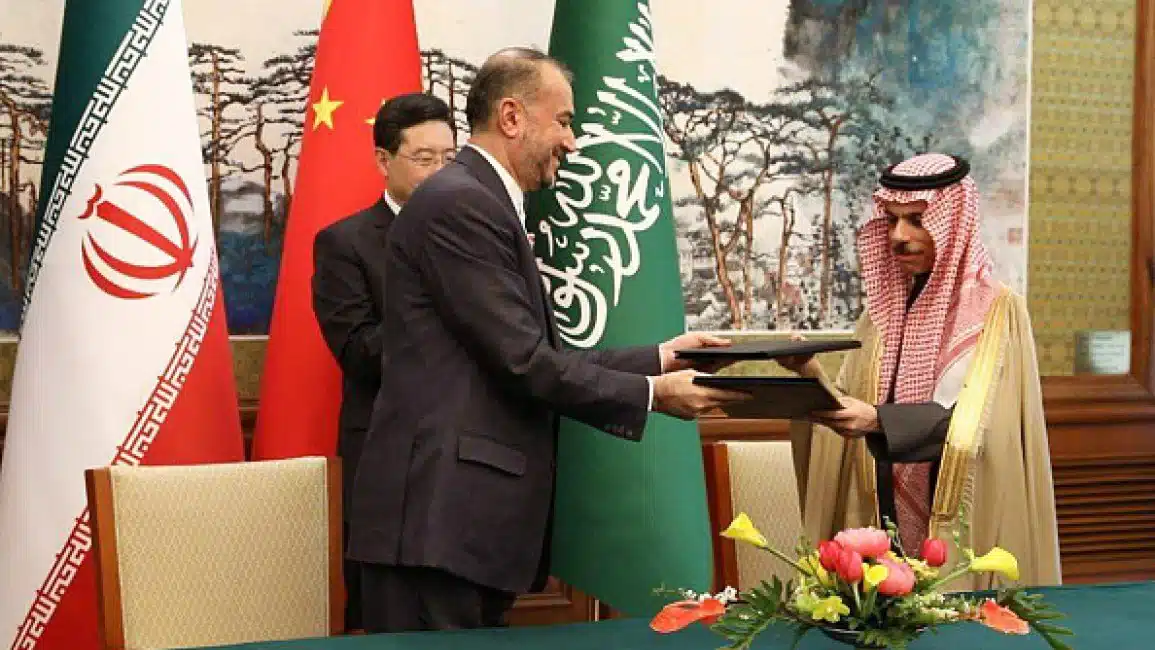On March 10th, 2023, a historic breakthrough in strategic diplomacy was achieved by China’s help when Saudi Arabia and Iran agreed to restore diplomatic relations, ending their seven-year hostility. The three countries issued a joint statement indicating that the two former adversaries, i.e., Saudi Arabia and Iran, have decided to resume diplomatic relations and reopen embassies after a meeting in Beijing.
This momentous decision marks a turning point in the relationship between these countries, with a regional and global impact.
China: A Mediator Between Nations
As per the Iran Press, a trilateral statement was signed between Iran, Saudi Arabia, and China’s political bureau of the Communist Party’s Central Committee in Beijing. The five-day negotiations from March 6 to 10 resulted in Rear Admiral Shamkhani, Wang Yi, and Musa’ed bin Muhammad al-Aiban agreeing to restore diplomatic relations and reopen embassies within the next two months. As per the meeting, the Foreign Ministers of Iran and Saudi Arabia will meet to implement the decision. Both nations have agreed to respect each other’s sovereignty and continue cooperating in various areas. This agreement is based on a security cooperation agreement signed in 2001 and a general agreement on cooperation in multiple areas signed in 1998.
This development indicates and highlights a few very important aspects. First, China’s emerging as the sole power with regional influence and the ability to mediate between the rivals. Secondly, it has somehow overshadowed the presence and role of the United States in the region, highlighting the emerging world as multipolar. Thirdly, isolationist policies no longer bring
peace and prosperity; instead, regionalism and regional cooperation are the only way towards sustainable development and peace for all.
The significance of this deal goes beyond just the two countries’ reconciliation. After many failed attempts by many countries to mend the deteriorating relations between Saudi Arabia and Iran, China finally achieved a landmark in the Middle East’s geopolitical arena. This historically significant event cements China as ‘the most important power’ in the region, greatly influencing and mediating a dialogue.
A Shifting Geopolitical Climate
What this move means for the region’s geopolitical environment is a critical question. Though Iran and Saudi Arabia supply oil to China and have good economic ties, this is the first instance where China has played a crucial role in the region’s rivalries, proving to be a successful mediator.
The Middle East’s geopolitical alignment is shaken due to this development, which undoubtedly marks a diplomatic triumph for Beijing.
China has made significant strides in bringing Iran and Saudi Arabia together for a trilateral dialogue, representing a noteworthy development in West Asian diplomacy. This achievement starkly contrasts the US’s long-standing inability to achieve this feat. As a result of this diplomatic victory, China is poised to increase its economic ties with Iran and Saudi Arabia, potentially boosting the amount of oil they buy and sell in Yuan. Furthermore, China’s Belt and Road Initiative (BRI) and its telecom infrastructure are the actual beneficiaries of this deal. The Gulf States, such as Saudi Arabia and the UAE, have already adopted Chinese technology, including 5G, AI-based solar power, and cloud computing. This adoption of Chinese technology is critical to China’s soft power, demonstrating the failure of US containment efforts.
This advancement also signifies the end of American influence in the Middle East. It puts the U.S. in the backyard, as this region was where the US had long been dominant in geopolitics. International politics is a game of the right action at the right time; whenever there is a vacuum, someone else will fill it. The same happened here. The void the U.S. created by isolating
countries and sanctioning them has been rightfully filled by the Chinese diplomatic efforts at highly unexpected places and times.
The global environment has changed. There is no single power to dominate the world order; many economies are emerging and paving their way towards multipolarity. Moreover, the indication of a rising multipolar world connected through regionalism as the way forward for all countries is well delivered through this agreement. Besides its geopolitical importance, this step by Iran and Saudi Arabia to re-establish ties is a massive step towards regional cooperation. Protectionist and isolationist policies are no longer in demand, as regional cooperation is now deemed crucial for the region, the states, and their citizens’ well-being. Security, development, peace, and the future are all connected and shared, as repeatedly advocated by China.
Fresh Optimism
China finished the agenda to reconcile Saudi Arabia and Iran with a wholesome victory first started by Iraq and Oman. This step of historic reconciliation was no less than a “diplomatic coup” by China, challenging US geopolitical dominance in the Middle East and furthering regional cooperation through dialogue and diplomacy.
This agreement will bring hope to the conflict-ridden Middle East, opening arenas for cooperation and development.
This may also initiate and support efforts to end the Yemen war and de-escalate tensions in the Middle East, ending conflicts and bringing much-needed peace and stability to the region.
How this agreement will affect regional dynamics, peace, and stability will be more visible in the coming days. Still, for now, China has been able to shock the world by mediating between two great rivals.
The views expressed in this article are the author’s own. They do not necessarily reflect the editorial policy of the South Asia Times





![Ukrainian and Russian flags with soldier silhouettes representing ongoing conflict. [Image via Atlantic Council].](https://southasiatimes.org/wp-content/uploads/2026/02/2022-02-09T000000Z_1319661209_MT1NURPHO000HXCNME_RTRMADP_3_UKRAINE-CONFLICT-STOCK-PICTURES-scaled-e1661353077377.jpg)

